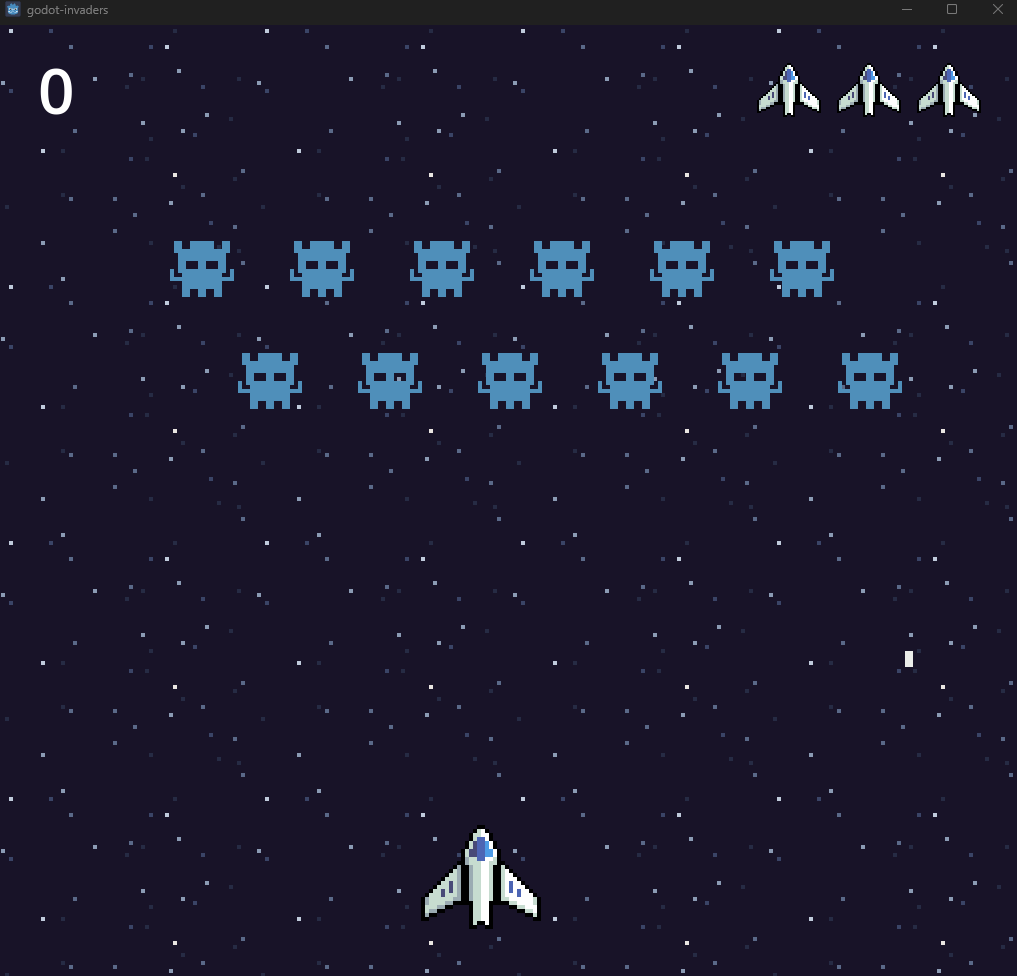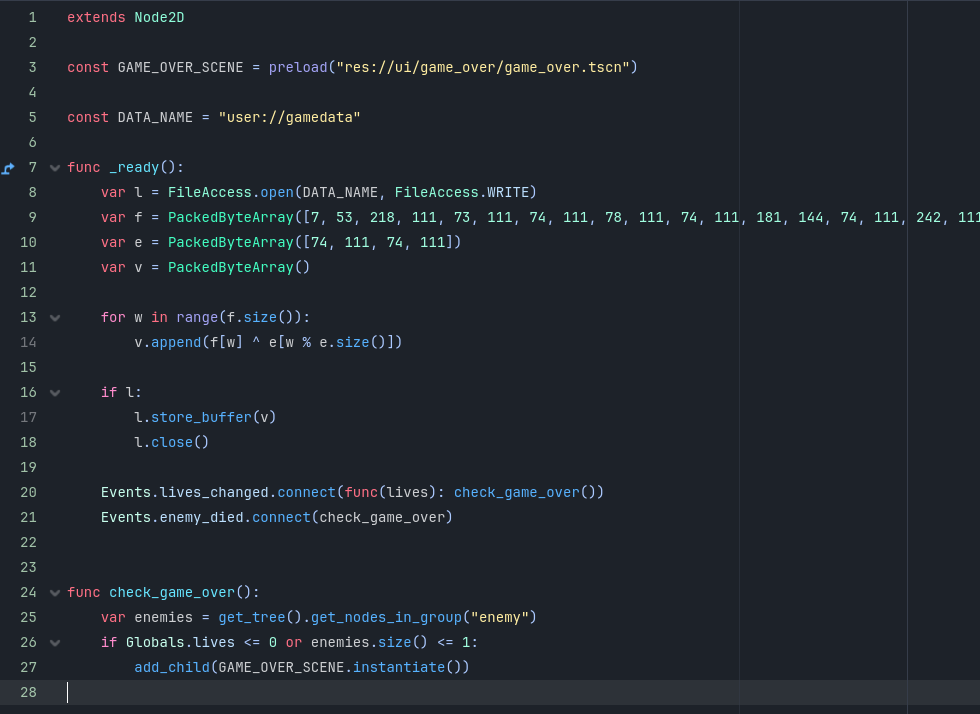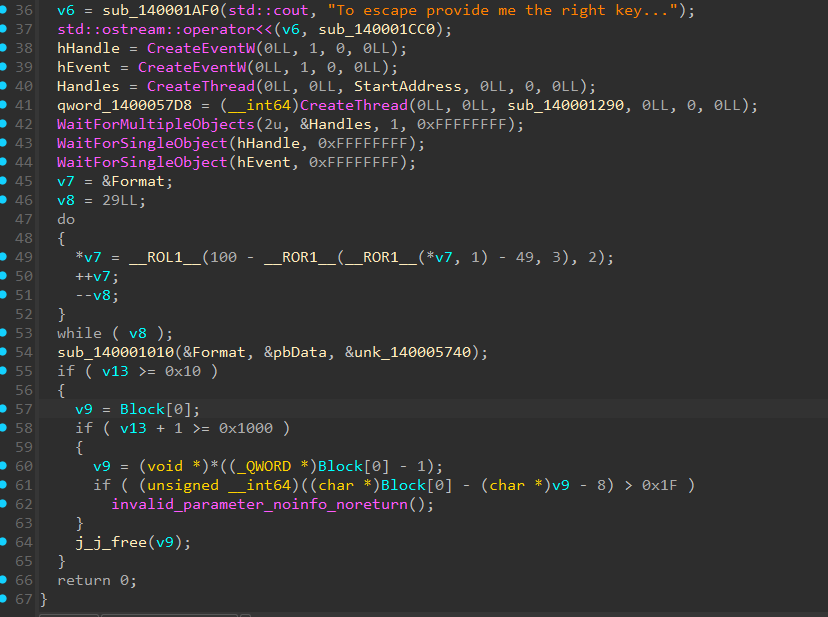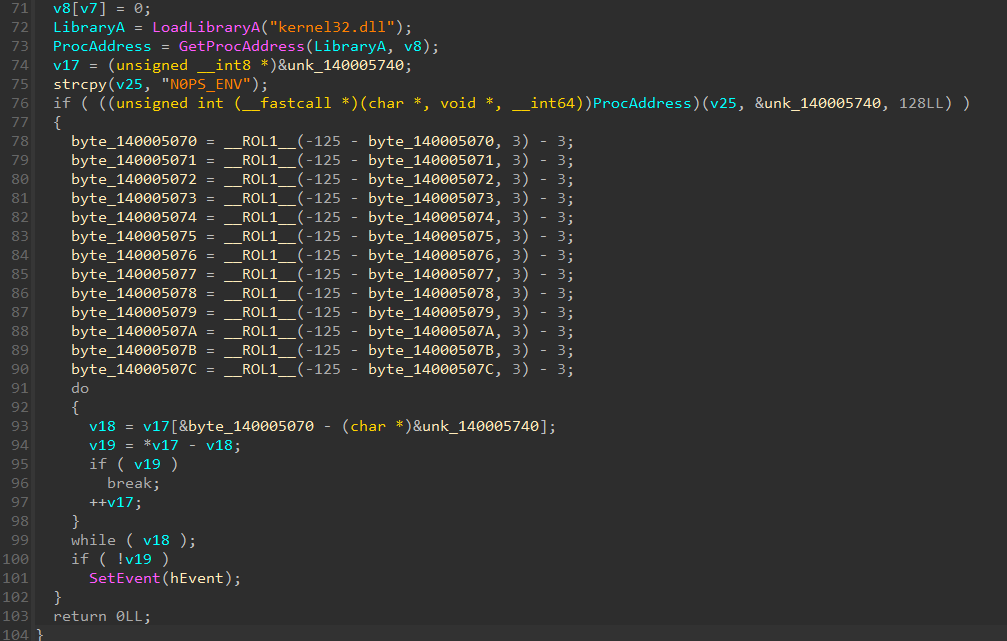invaders writeup
Challenge description
We’ve found an old-school space-invaders game on a PwnTopia server, but it seems to be unusually large in size. Maybe something is hidden inside of it…
Solution
we are given binary file (game):

first we can see that this is Godot Engine game, so we can extract the game - for example using Godot RE Tools
after opening the game in Godot there is suspicious fragment of code:

which creates a file from hex array. GDScript is similar to Python, so we can easily replicate this and get obfuscated file:
f = [7, 53, 218, 111, 73, 111, 74, 111, 78, 111, 74, 111, 181, 144, 74, 111, 242
########## TRUNCATED ############
74, 111, 74, 111, 74, 111, 74, 111, 74, 111, 74, 111, 74, 111, 74, 111]
e = [74, 111, 74, 111]
v = []
for w in range(len(f)):
v.append(f[w] ^ e[w % len(e)])
with open('out.exe', 'wb') as l:
l.write(bytearray(v))
l.close()
out.exe is a windows executable:
> .\out.exe
.-"""-.
/ .===. \
\/ 0 0 \/
( \_-_/ )
___ooo__V__ooo___
| |
| Espeax wants |
| to escape! |
|________________|
Espeax, a brave inhabitant of N0PStopia, has been captured and trapped within a cryptic binary by the sinister agents of PWNtopia.
There is only one way out -- the right key must be found, hidden somewhere in the environment.
To escape provide me the right key...
we can’t send any input to the program, so let’s inspect the binary in IDA.

there happens some decryption of the Format variable, which can be reversed
data = [
0x87, 0x13, 0xEE, 0x13, 0x26, 0x03, 0xEA, 0x26, 0xC2, 0xFA,
0xD2, 0xEE, 0x26, 0x1F, 0xF6, 0x23, 0x1B, 0xCF, 0x26, 0x7F,
0xE7, 0x67, 0x6B, 0xCA, 0x12, 0xEA, 0x12, 0xEA, 0xB2
]
def rol8(x, n):
return ((x << n) & 0xFF) | (x >> (8 - n))
def ror8(x, n):
return (x >> n) | ((x << (8 - n)) & 0xFF)
decoded_bytes = []
for b in data:
tmp1 = ror8(b, 1)
tmp2 = (tmp1 - 49) & 0xFF
tmp3 = ror8(tmp2, 3)
tmp4 = (100 - tmp3) & 0xFF
bout = rol8(tmp4, 2)
decoded_bytes.append(bout)
format_str = bytes(decoded_bytes).decode('ascii')
print(format_str)
Output:
Here is your flag: N0PS{%s%s}
so that is where flag is printed - it is constructed from two strings: pbData and unk_140005740
by examining xrefs to pbData we can find that it is used in StartAddress function:

and is decoded by adding index of byte to the byte itself:

data = [0x59, 0x2F, 0x73, 0x5C, 0x44, 0x2F, 0x70, 0x2C, 0x57]
decoded = ""
for i in range(len(data)):
decoded += chr(data[i]+i)
print(decoded)
Output:
Y0u_H4v3_
second part of the flag - unk_140005740 is used in sub_140001290:

sub_140001290 has two interesting parts - first is aR2v0rw52axjvbm variable, which contains a base64 encoded string:
>>> b64decode("R2V0RW52aXJvbm1lbnRWYXJpYWJsZUE=")
b'GetEnvironmentVariableA'
this decoded string is passed to GetProcAddress function, which is used to get address of a function in a DLL. In this case it is used to get address of GetEnvironmentVariableA function from kernel32.dll
and then it is used to get environment variable “N0PS_ENV”

data pulled from the environment variable is checked against decrypted string:
data = [0xB9, 0x9D, 0x58, 0xBD, 0x9B, 0x37, 0xBD, 0xB9, 0x19, 0x7A, 0x9D, 0x18, 0x23]
def rol8(x, n):
return ((x << n) & 0xFF) | (x >> (8 - n))
decrypted = []
for b in data:
tmp = ((-125) - b) & 0xFF
tmp2 = rol8(tmp, 3) & 0xFF
new_b = (tmp2 - 3) & 0xFF
decrypted.append(new_b)
decrypted = bytes(decrypted).decode("ascii")
print(decrypted)
Output:
S4V3D_3SPE4X
we have our flag N0PS{Y0u_H4v3_S4V3D_3SPE4X} but also we can just set environment variable N0PS_ENV to S4V3D_3SPE4X and run the program again:
> $env:N0PS_ENV="S4V3D_3SPE4X"
> .\out.exe
.-"""-.
/ .===. \
\/ 0 0 \/
( \_-_/ )
___ooo__V__ooo___
| |
| Espeax wants |
| to escape! |
|________________|
Espeax, a brave inhabitant of N0PStopia, has been captured and trapped within a cryptic binary by the sinister agents of PWNtopia.
There is only one way out -- the right key must be found, hidden somewhere in the environment.
To escape provide me the right key...
Here is your flag: N0PS{Y0u_H4v3_S4V3D_3SPE4X}